Northamptonshire Law Society Bulletin


www.northamptonshirelawsociety.co.uk Winter/Spring 2023

Managing Editor: Carolyn Coles
Advertising: Simon Castell

Key Account Manager: Denise Castell
Design: East Park Studio
Accounts: Tony Kay
Media No. 1111 Published
Legal

Published by East Park Communications Ltd. Unit 27a, Price St. Business Centre, Price St., Birkenhead, Wirral, Merseyside, CH41 4JQ Tel: 0151 651 2776 simon@eastparkcommunications.co.uk www.eastparkcommunications.co.uk
March 2023
Notice © East Park Communications Ltd.
of the editorial or photographs may be reproduced without prior written permission from the publishers. East Park Communications Ltd would like to point out that all editorial comment and articles are the responsibility of the originators and may or may not reflect the opinions of East Park Communications Ltd. Correct at time of going to press. www.northamptonshirelawsociety.co.uk 3 Contents Northamptonshire Law Society 4 The President Writes 6 Strategic Lawsuits against Public Participation (SLAPPs)/abusive litigation 8 US executive order re US-EU data transfers 8 Annual Bar & Young Bar Conference 2022 10 President’s Events update 11 Cost of Living Crisis: What Does it Mean for Northamptonshire Property Lawyers? 12 The importance of independence: preserving the integrity of the Expert Witness discussion 14 Young adults and consent to a DNA test 16 Plan-demic: Brits more likely to plan their legacy 19 How will the cost-of-living impact gifts in Wills? 20 Relationships remain key in the age of technology 22 Women’s History Month shines spotlight on female empowerment in the legal profession over the past century 23 And Finally... Carolyn Coles Winter/Spring 2023
None
Welcome to this edition of the Bulletin...

I am pleased to present to you the first edition of the Bulletin for 2023.
It has been a busy and encouraging start to the year. Despite the slow in the housing market I am pleased to report that many of those with whom I speak with have reported business has remained steady and despite the reports in the legal press I have heard of few redundancies or “cut backs”.
In fact, at the recent NLS Marsh Risk and Compliance Conference I had the opportunity to speak to a number of
Northamptonshire Law Society Officers & Council Members 2022
President
Jabeer Miah
Deputy President
Maurice Muchinda
Immediate-Past President

Sharine Burgess
Honorary Secretary
Ika Castka
Honorary Treasurer
Afua Adane
Constituency Member & Past President
Linda Lee
Council Members:
David Browne
Laura Carter
Michael Orton Jones
Euan Temple - Past President
Edward St John Smyth - Past President
Afua Adane
Lynsey Ward Sarah Franklin Society Manager
Carolyn Coles
Northamptonshire Law Society
The Gatehouse, Stable Lane
Pitsford
Northampton
NN6 9NG
Tel: 01604 881154
Email: Sec.nls@outlook.com
All Council members should in the first instance be contacted through the Society Manager.
Senior Partners and recruitment and retention seemed to be the ongoing concern, together with the bureaucracy of management tasks. In view of this we are looking at re-starting the Manging Partners Lunch so that we can share best practice and tips and we hope to engage more firms via this. If you are interested in joining, please do get in touch.
It was fantastic to see a huge number of Firms and Senior Partners support the Marsh Risk & Compliance Event and thank you to our Nam Qureshi and Victoria Prescott of our Patrons for the same. It was a very enlightening event and if you would like the slides which I feel are very useful please contact me or Carolyn.
I would also like to thank Mev Dzihic of Verify 365 for sponsoring the delightful lunch at the Marsh Compliance Event and we are pleased to announce that we are in the process of arranging a networking event together. Please look out for the same.
I am also pleased to announce we have an upcoming Conveyancing CPD Event entitled “Hot Topics in Residential Leasehold Conveyancing, including Building Safety” to be presented by Stephen Desmond in association with X-Press Legal Services to take place on 13th June 2023 and again look out for the same.
The NLS Council has continued to plan for the future and I would invite any expressions of interest for joining the Council.
I have continued my efforts to ensure the NLS is engaged in the local community and was honoured to attend the University of Northampton Law Fair together with our Society Manager and to speak to students and to sign up their interest in student affiliate membership. It was a great event and gave us the opportunity to speak to many students as well as engage with all the exhibiting Firms and I was able to speak to most Firms.
In keeping with education I was invited by The University of Buckingham together with my Assistant; Craig Dell
to hold a Careers Talk to students about our journeys into the career and to answer questions by the future of the profession. I have been asked by Sponne School in Towcester to undertake a similar task in April and we have once again been invited to attend the Law School graduations at both the University of Northampton and DeMontfort University.
As your President I am pleased to say DeMontfort University have also invited me to attend a dinner with the Vice Chancellor; Professor Katie Normington at The Honourable Society of Gray’s Inn in April.
Once again, I was asked to judge for the Birmingham Law Society Legal Awards at St Phillips Chambers and to attend their prestigious awards, together with the Manchester and Liverpool Law Society Presidents increasing our friendship and exchange of ideas.
We continue to support KidsAid; a local charity that assists Children who have suffered trauma with much needed care; further information can be found at www. kidsaid.org.uk and we are now working with Anne-Marie Dhillon of Law-Works, The University of Northampton and Rachel McGrath of Northamptonshire Community Foundation to restart a Pro Bono Legal Clinic in the county.
I am still keen to engage new members and local non-member firms and I would be pleased to hear from such with any suggestions or an invitation to meet.
I can be contacted at jm@shepherdandco.com
Best Regards
Jabeer Miah
President, Northamptonshire Law Society 20.03.2023
Northamptonshire Law Society
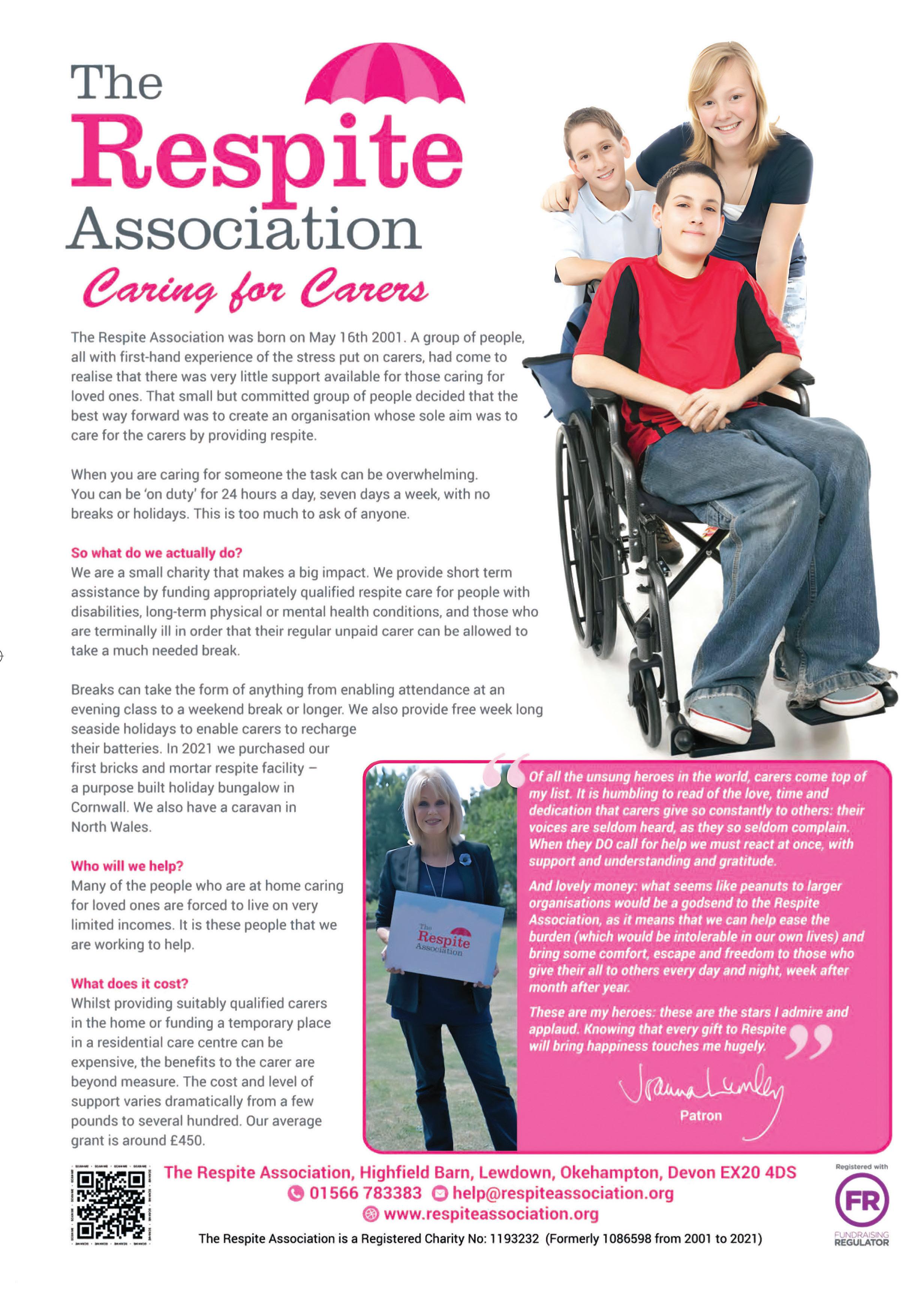
Strategic Lawsuits against Public Participation (SLAPPs)/abusive litigation
During the last ten years, there has been worldwide condemnation of litigation, described as SLAPPs. The term was originally coined by Denver professors in the 1980s . Initially regarded by many in England and Wales as an american phenomenon, there has been increasing criticism of lawyers in this jurisdiction by parliamentarians, the press and public.
So what is a SLAPP? ,‘In a typical SLAPP, the plaintiff does not normally expect to win the lawsuit. The plaintiff’s goals are accomplished if the defendant succumbs to fear, intimidation, mounting legal costs, or simple exhaustion and abandons the criticism. In some cases, repeated frivolous litigation against a defendant may raise the cost of directors and officers liability insurance for that party, interfering with an organisation’s ability to operate’ii
The Solicitors Regulation Authority (SRA) has expressed concern about abusive litigation, beginning with its original review of conduct in litigation in 2015, ‘Walking the Line -balancing duties in litigation’ in March of 2015.iii Considered controversial at the time, given the appearance of interfering in the client/solicitor relationship, it was initially paid little heed by the profession. Since then, there has been a raft of guidance, some very specific, for example that relating to holiday claims, which seek to put limits on which claims can be brought and how they can be brought. In fairness, the guidance has highlighted matters which no solicitor would dispute as correct for example, a prohibition on misleading the court.
The SRA published a Warning Noticeiv on 28 November 2022 on SLAPPs. This states, ‘the key aim of a SLAPP is to prevent publication on matters of public importance, such as academic research, whistleblowing or campaigning or investigative journalism. Claims of defamation or invasion of privacy are the causes of action most associated with SLAPPs, but other causes of action (such as breach of confidence) could also be used for this purpose.’
The Warning notice refers to the government’s proposed a three-part test to identify a SLAPP claim.
• the case relates to a public interest issue
• it has some features of an abuse of process
• it has insufficient evidence of merit to warrant further judicial consideration
Under the proposed reforms by the government, any such case would be subject to early dismissal by the court.
The SRA goes further, it states that, ‘Regardless of whether or not a case fulfils all three limbs of the above test, we are able to take action in respect of abusive conduct. SLAPP threats, if they achieve their goals, often do not reach court. Again, this does not prevent us from investigating complaints.’
The SRA also list conduct which they think merits disciplinary action such as:
• Seeking to threaten or advance meritless claims, including in pre-action correspondence, and including claims where it should be clear that a defence to that type of claim will be successful based on what you know.
• Claiming remedies to which the client would not be entitled on the facts, such as imprisonment upon a civil claim, or specific or exaggerated costs consequences.
• Making unduly aggressive and intimidating threats, such as threats which are intended to intimidate recipients into not seeking their own legal advice.
• Sending an excessive number of letters that are disproportionate to the issues in dispute and the responses received.
• Sending correspondence with restrictive labels (see below) that are intimidating but inaccurate.
• Pursuing unnecessary and onerous procedural applications, intended to waste time or increase costs, such as for excessive disclosure.
The SRA also caution against labelling or marking correspondence ‘not for publication’, ‘strictly private and confidential’ and/or ‘without prejudice’ when the conditions for using those terms are not fulfilled.
As some of the larger commercial firms become aware of the risks of being involved in this type of litigation or representation, clients are looking for a wider pool of firms to instruct than they may have done previously. It is vital that all firms consider their exposure to this type of action, review the warning notice and put in place policies for vetting potential clients and matters. However, training for staff in litigation should now be far wider than simply in relation to SLAPPs.
In February 2023, the SRA published its thematic reviewv, this should be essential reading for all COLPs who have litigation teams. As part of the review, the SRA visited 25 firms, they spoke to Heads of Department of firms conducting commercial disputes, property disagreements or employment matters and reviewed the firms’ litigation policies and procedures, reviewed litigation files and spoke to junior fee earners. The investigation was wider than SLAPPs, looking at what the SRA regarded as abusive litigation generally.
There was concern about the number of litigators who were unaware of SLAPPs. However, the SRA has taken onboard the feedback from the firms that providing examples of cases that would be regarded as SLAPPs by the SRA would assist the profession. It is anticipated that there will be publication of case studies this year.
The SRA considered that greater knowledge and training in litigation is required in many firms and highlight a lack of competence. The SRA also stated that there was room for improvement in how firms and solicitors were managing risks in handling disputes. Although the SRA did not find any cases of improper use of labelling of correspondence, they did discover a lack of proper policies and procedures for how to deal with litigation and what the SRA term, ‘reputation management matters’.
Another area of concern for the SRA related to failure to make appropriate reports to the SRA. The SRA states that although firms are not obliged to have policies and procedures in place, ‘they are an important tool to make sure the firm has a clear record of key issues and concerns and all staff understand their obligations and the specific risks that can arise in this area’. It would seem prudent that COLPs consider putting in place such policies or consider what other means they would use to ensure that appropriate reports are made to the SRA in relation to litigation.
As a minimum COLPs should ensure that all litigation fee earners are aware of the key points in Conduct of Litigationvi and Balancing duties in litigationvii. The SRA have indicated that they will be carrying out further thematic reviews on this subject and calls to the Solicitors Assistance Schemeviii suggest that the SRA are taking complaints
6 www.northamptonshirelawsociety.co.uk
Northamptonshire Law Society Law Society
relating to conduct in litigation very seriously. Anecdotally it would seem that firms are increasingly reporting opponents in litigation.
Legal Ombudsman Service (LeO)
A reminder that from 1 April 2023 the LeO scheme rules change and the time for clients to bring a complaint are reduced to within:
• one year from the date of the problem complained about occurring; or
• one year from the date when the client first realised that there was a problem.
These new rules will not be applied retrospectively to cases that were brought to LeO before 1 April 2023. There are also changes in discretion to dismiss or discontinue complaints and the discretion to decline to issue an ombudsman decision. Clients should be notified of the changes to the rules prior to 1 April. Material such as client care information, terms of business, information on websites and any other signposting or guidance that outlines when a complaint can be taken to LeO must be updated.
LeO have published guidance for solicitors including templates.ix

She can be contacted by email at: lindakhlee@aol.com
i professors Penelope Canan and George W. Pring.
ii McDevitt, John (16 May 2013). “Whacked By Lawsuit Costs, Old City Civic Association Disbands”. KYW-TV, CBS. Philadelphia.
iii https://www.sra.org.uk/globalassets documents/solicitors/freedom-inpractice/walk-the-line pdf?version=4a1abe&_t_ ip=207.46.13.93
Linda Lee has been Council Member for Leicestershire, Northamptonshire and Rutland since 2003. She is a past President of the Law Society of England and Wales and is the current Chair of the Professional Indemnity Insurance Committee and a member of the Policy and Regulatory Affairs Committee, the Regulatory Processes Committee and Access to Justice Committee. She is current Chair of the Solicitors Assistance Scheme. Linda is an experienced litigation solicitor and is a Consultant at Weightmans, where she specialises in solicitors’ disciplinary, compliance and regulatory work.
iv https://www.sra.org.uk/solicitors/ guidance/slapps-warning-notice
v https://www.sra.org.uk/sra/researchpublications/conduct-disputes
vi https://www.sra.org.uk/solicitors/ guidance/conduct-disputes

vii https://www.sra.org.uk/sra/researchpublications/balancing-duties-litigation
viii https://www.thesas.org.uk
ix https://www.legalombudsman.org.uk/ media/xfrfzben/guidance-scheme-rulesapril-2023.pdf
www.northamptonshirelawsociety.co.uk 7 Northamptonshire Law Society
Article by Linda Lee Council Member
US executive order re US-EU data transfers The
question Post-Schrems
mean
II, what
does
the new US Executive Order
for personal data transfers between the EU and
The key takeaway
An Executive Order was signed by President Biden which represents the next step in implementing a new EU-US data transfer mechanism. The European Commission will now need to take a formal Adequacy Decision, although this may well be challenged in particular by Max Schrems.
The background
The EU General Data Protection Regulation (GDPR) restricts transfer of personal data from the EU to third countries. Previously, the EU-US Privacy Shield allowed for such transfers to recipients in the US. However, in 2020, the European Court of Justice (ECJ) ruled in the Schrems II case that the Privacy Shield was invalid and could no longer be used as a legal basis for data transfers. As this decision was made prior to Brexit, it also applies in the UK in the context of the UK GDPR.
In March 2022, the European Commission and the US announced their agreement on a new Trans-Atlantic Data Privacy Framework (the Framework) which sets out a range of measures to address the concerns raised by the ECJ in Schrems II.
The development
On 7 October 2022, President Biden signed an Executive Order setting out the steps the US will take to meet its obligations under the Framework.
The Executive Order provides protections for personal data received in the US including new safeguards limiting the US government and intelligent services’ access
US?
to personal data. US officials will only be able to access what is “necessary and proportionate” to protect national security.
The Executive Order also provides remedies for individuals whose privacy rights are breached through an independent and impartial redress process. This includes the establishment of a new Data Protection Review Court to review complaints against US national security authorities who access personal data improperly. The Court will have various powers including ordering companies to delete personal data.

The results of the redress process will be binding on US intelligence services. The European Commission will now need to adopt a formal Adequacy Decision. The process typically takes six months.
However, the privacy activist behind the Schrems II case, Max Schrems, has said that the Executive Order does not satisfactorily address the issues of the former Privacy Shield. Schrems said he will likely challenge any Adequacy Decision by applying for an injunction in a national court against a company that relies on the adequacy decision.
Post-Brexit, data transfers out of the UK are subject to the UK GDPR and the UK’s own Adequacy Decisions. The UK Government has confirmed that it is separately working towards a new Adequacy Agreement in respect of UK-US transfers.
Why is this important?
A Data Adequacy arrangement between the US and EU would remove the need for additional safeguards to be put in place, typically Standard Contractual Clauses
(SCCs) or Binding Corporate Rules, which are costly and time-consuming to agree. Therefore, the issuing of the Executive Order is welcome news for businesses looking for a more streamlined way to transfer data to the US.
Any practical tips?
While this is a major development, we still await the European Commission’s Adequacy Decision. If the Adequacy Decision is passed, it would still be prudent to continue as per normal (eg by using the SCCs) until it becomes clear if and how effective Mr Schrems’s challenge may be – noting of course that his previous attacks (on both the Privacy Shield and the Safe Harbour before it) were both effective in killing them off.
Article by Euan Temple
Northamptonshire Law Society
8 www.northamptonshirelawsociety.co.uk


www.northamptonshirelawsociety.co.uk 9 Northamptonshire Law
Society
Events update
Our President has had a very busy few months in which he has attended a number of events on the Society’s behalf. A full report will be provided in the next edition.



BIRMINGHAM LAW SOCIETY EQUALITY AND DIVERSITY AWARD
Bridging the Bar, 3PB Barristers
Capsticks Solicitors LLP
Shakespeare Martineau
Squire Patton Boggs (UK) LLP
Thursfields Solicitors
PARTNER OF THE YEAR
Ruth Griffin - Gowling WLG
Mark Hands - Irwin Mitchell LLP

Ian Jones - Spencer Shaw Solicitors Ltd
Christopher Plumley - Trowers & Hamlins
Shivaji Shiva - VWV
Sponsored by
BIRMINGHAM LAW SOCIETY IN-HOUSE AWARD
Birmingham Organising Committee for the 2022 Commonwealth Games
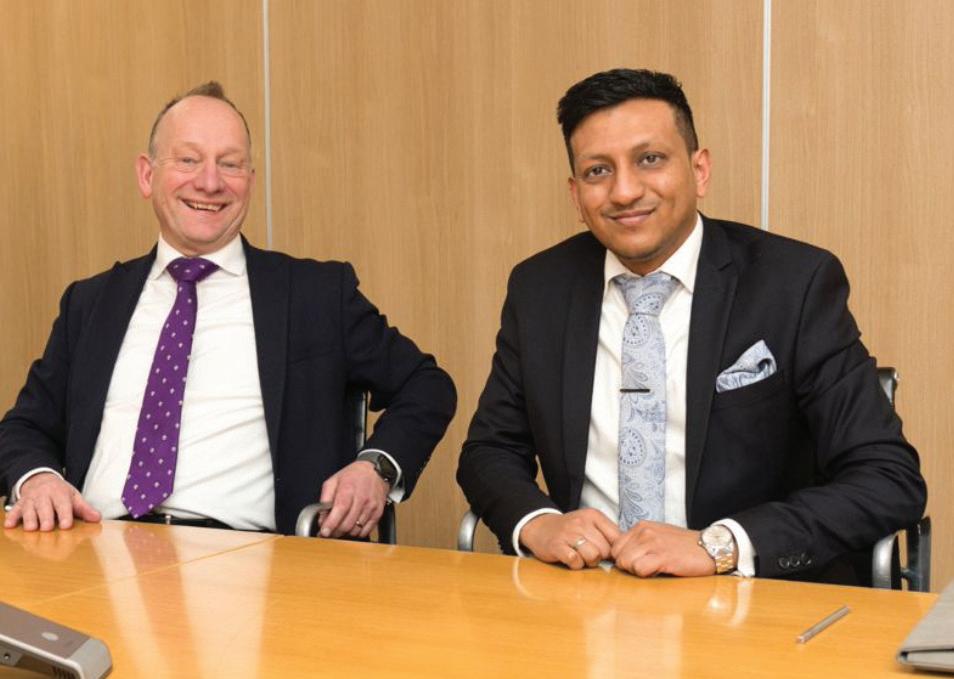

Bal Atwal, West Midlands Police
Tamina Greaves, Crown Prosecution Service
Neena Janda, Zappi
Kuldip Kaur, HSBC Bank PLC
10 www.northamptonshirelawsociety.co.uk Northamptonshire Law Society
Judging with Nicholas Johnson the President of Manchester Law Society for the Birmigham Legal Awards.
A immense honour to welcome Retired Justice M Imman Ali of the Appellate Division of the Supreme Court of Bangladesh and the newly elected Honourable Mayor of Biswanath; Muhibur Rahman.
Great to be part of the organising team raising funds for vulnerable and disabled people in #bangladesh via the Valerie Taylor Trust (VVT), together with Farhan Masud Khan of Channel S, Babul Hussain, Abdul Kuddus and M A Rouf.
Cost of Living Crisis: What Does it Mean for Northamptonshire Property Lawyers?
In March, Dye & Durham commissioned an independent survey of 2,000 UK mortgage holders to understand the extent of the cost-of-living crisis and, specifically, how it is impacting short-term spending, long-term financial planning and day-to-day budgeting.
The survey revealed a general feeling of unease and uncertainty. Nearly a third of respondents (30%) say they are worried they’ll fail to make mortgage payments within the next year.
With recession worries and rising interest rates weighing heavily on the nation’s mortgage holders, our research showed the impact not only on decisions about buying or selling homes but also on their financial wellbeing and mental health.
For conveyancing and property solicitors who rely on transaction volumes, it’s critical to identify ways to shield against volatile property market conditions and to help ease the overall anxieties of homeowners. We believe the answer may lie with digitisation and unlocking technology.
First, let’s take a closer look at what mortgage holders in the Midlands told us:
• Those in the West Midlands are some of the hardest hit with 59% stating the cost-of-living crisis is affecting their mental health compared with 52% in the East Midlands and 56% nationally
• Two thirds (67%) of those in the East Midlands are worried offspring will be unable to get into the housing market compared with 66% nationally and 63% in the West Midlands
• 27% in the Midlands are worried they will fail to make mortgage repayments within the next year
• More than a third (37%) of respondents in the East of the region expect it will take significantly longer to pay off their mortgage than originally anticipated compared with 39% in the West Midlands (36% nationally)
• 50% of those in the East Midlands expect to have less money to put into savings, pensions or investments compared with 40% in the West Midlands
• 39% of mortgage holders in East Midlands said they could comfortably afford to continue paying their mortgage for just two months or less, if there was a change of circumstances for the main income earner, compared to 34% in West Midlands and 22% in London
• 55% across the Midlands have reduced the personal usage of their car to save money.
It’s clear that economic uncertainty, including the effects of high interest rates, energy bills and increased costs overall, is weighing on the minds of the nation’s property owners — and the fallout cannot be underestimated.
Our survey data shows us that people across the UK are concerned about both their short- and long-term financial
futures and, as such, have reduced spending, raided savings and are delaying major purchases.
What does this mean for the industry?
Many UK law firms continue to manage much of their operations via manual or resource-intensive processes, which lack the necessary ease of access, seamless case management abilities or increased security measures to be truly productive and profitable.
Strategic plans to digitise processes were put on hold by many firms amid the peak in property transactions following the COVID-19 pandemic as they concentrated on taking cases from the offer phase through to completion.
The survey findings point to the fact that the UK property market may face considerable challenges due to consumers’ reservations, but there are steps that can be taken now to help weather the storm.
Firms that take action now, while transaction volumes are lower, to examine their resources and adopt tools designed to digitise and modernise workflows — and increase productivity and profitability — will have a significant head start on their competitors once the market returns to normal.
By adopting digital practice management tools, legal professionals can spend more time on revenue-driving tasks and less on non-billable administration like case management, client intake and invoicing.
At the same time, increasing the security of your information, reducing overall risk and providing a more modernised customer experience for clients can only benefit all – both now and in the future, when the market bounces back to previous levels.
If you’re interested in finding out ways you can protect your bottom line against market volatility, contact the Dye & Durham team today: http://bit.ly/3FotstY
www.dyedurham.co.uk
About the survey: Using an online methodology, Danebury Research conducted a nationally representative survey of 2,000 UK based homeowners with a mortgage aged between 18 and 65. Fieldwork was conducted from 12th February to 16th February, 2023.
www.northamptonshirelawsociety.co.uk 11 Northamptonshire Law Society
###
The importance of independence: preserving the integrity of the Expert Witness discussion
We take a look at how the distinction between being an independent Expert Witness is crucial in a court case.
As an Expert Witness, your remit is clear: although you’re instructed by either the defendant or claimant, your obligation is to the court. You should be independent, not partisan. But ensuring you maintain that independence isn’t always straightforward.
As we reported back in March, a litigation case where an expert seeking input from solicitor led to a conclusion that the expert was not independent – resulting in £225,000 of evidence being revoked.
The ruling was deemed a “shockwave” by Recorder Simon Jackson KC during the Lessons from the Courts panel session at our June 2022 conference. “It’s a stark reminder [to Expert Witnesses] of what their duties are in terms on compliance with the rules and honouring the declarations which they make”, Jackson remarked.
So, what went so wrong in this case?
And how can the Expert Witness community ensure they learn from the ruling to preserve their integrity and avoid something similar happening again?
Independent vs partisan
The case in question, Patricia Andrews & Ors v Kronospan Limited [2022] EWHC 479 (QB), was a group litigation claiming nuisance. It involved a group of residents complaining that the owners of a nearby timber plant were contaminating their homes with dust.
With dust a central part of the case, it comes as no surprise that the claimant’s solicitors instructed several experts in various areas of it, including Dust Analysis and Monitoring specialists.
After these Experts had been engaged for some time, the defendant’s solicitors became aware there had been contact between one of the claimant’s Dust Analysis and Monitoring experts and his instructing solicitors during the joint statement discussion period.
The expert in question had sent several drafts of the joint statement to the solicitors, seeking their views and input and
received it from them, all without informing his Expert Witness counterpart.
Presiding over the case was Senior Master Barbara Fontaine, who stated in her judgment: “the primary concern, having seen the communications between the Claimants’ solicitors and [the expert], is that [the expert’s] approach strongly suggest that he regards himself as an advocate for the Claimants, rather than as an independent expert whose primary obligation is to the court.”
Not a clear-cut decision
To help reach her conclusion, Senior Master Fontaine examined two other cases involving misconduct by Expert Witnesses – both with very different outcomes.
In the first case, BDW Trading Ltd v Integral [2018] EWHC 1915 (TCC), a defendant’s expert revealed during cross-examination that he had sent a first draft of his joint statement to his instructing solicitors and had received feedback, making some changes to his draft as a result.
The judge in that case acknowledged that while the expert’s behaviour was a serious transgression, he genuinely wasn’t aware his behaviour was inappropriate and his communication with solicitors didn’t affect his opinion in any way.
At the opposite end of the spectrum, in Dana UK Axle Limited [2021] EWHC 1413 (TCC) experts receiving technical input from the instructing party at every stage in the process without revealing that to the other party. The indiscretion, meanwhile, only came to light halfway through the trial. Such a flagrant disregard for the impartiality rule meant that the judge had no real option but to disallow the evidence.
Reflecting on her resulting judgement in the Andrews vs Kronospan case, Fontaine explained she concluded that, “the expert’s evidence should be excluded because the court could have no confidence in his ability to act in accordance with his obligation as an expert authority.”
Is it ever OK to be in communication with solicitors?
Discussion between experts and solicitors during the draft report stage is allowed. In fact, solicitors are usually involved to make sure they understand what’s being said and what each side’s case is. “That’s quite different from the joint statement process, which is an inviolable process where just the two experts discuss their views without outside interference”, explained Fontaine.
Referring to the Technology and Construction Court (TCC) guide and its relevance to other cases, Fontaine noted:
“It says while the party’s legal advisors may assist in identifying issues which the statement should address, they should not be involved in negotiating or drafting the experts’ joint statement […] unless there are serious concerns where the court may misunderstand or be misled by the terms of the joint statement.”
In such circumstances, solicitors from both sides must be involved.
Lessons from the courts
• Be open – and get any communication with other parties in writing. Transparency and accountability are key: whatever is done needs to be done overtly.
• Remember that the onus should be on solicitors to behave appropriately and uphold their duty to the court too. So, if they try to get involved in drafting the joint statement, remind them they are not allowed to be involved.
• Make sure your declarations at the end of your report are up to date, or it could undermine you in court during cross examination.
• Focus on the issues at hand. You should encourage solicitors to provide you with a list of the key areas of contention which should be discussed but should not be inviting comment on what is said.
Senior Master Fontaine and other senior legal professionals discussed the topic of Expert Witness integrity and more at our June 2022 conference, Lessons from the Courts, which is available to purchase now.
12 www.northamptonshirelawsociety.co.uk
Northamptonshire Law Society



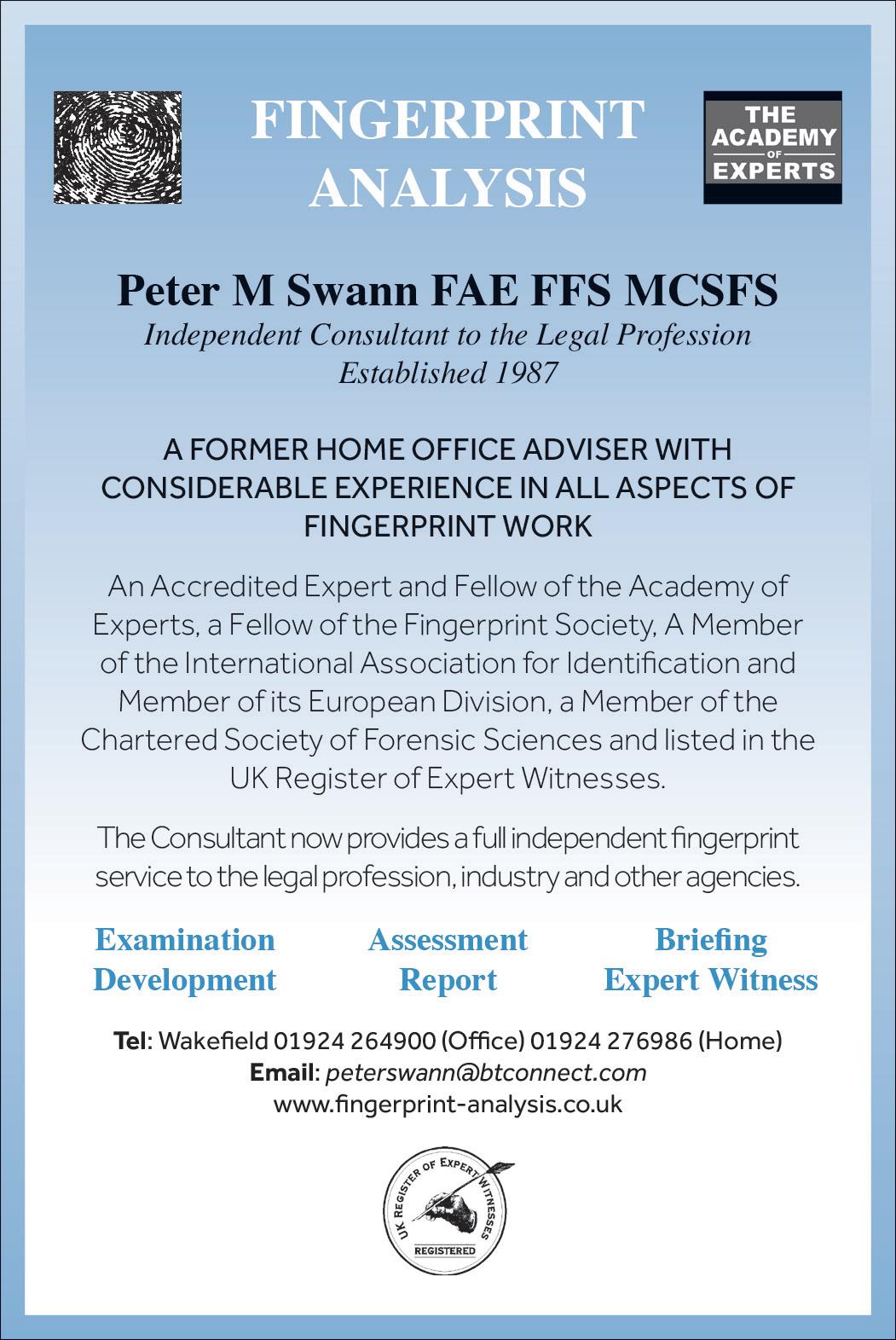
www.northamptonshirelawsociety.co.uk 13 Northamptonshire Law Society
Young adults and consent to a DNA test
Across the world, the ability of children or indeed young adults to make decisions about issues concerning themselves is full of dilemma.
Under UK law, the line between childhood and adult hood is 18 years of age 1 ; the age of majority. This means for example, that an individual can of their own volition, vote, enter contracts (credit cards, take out loans) buy tobacco or get a tattoo. The law then allows for capacities at each age from 10 through 17, though in this article with regard to DNA testing, we will single out age 16, as now armed with a National Insurance number, minors may join the Army, get married, drink alcohol in a restaurant, get a full time job and have sexual intercourse. This is perhaps appropriate for most in todays’ UK society.
When it comes to medical treatment, then the law is very clear that the age of consent to a procedure is 18 and after this age, individuals have as many rights as adults. Under some circumstances, 16 year old individuals can make medical decisions without consent of their parents and at younger ages than that, the degree of independent consent is reliant on their competence to understand the procedure –age alone is a not a sufficient criterion. Specifically, the test of these criteria is the Gillick test 2 which relates to a child under 16 receiving contraceptive advice without her mother’s consent. Over time this has been used by the medical fraternity to gain consent from under 16s, provided they can demonstrate understanding of the nature and implications of the proposed treatment. A subset of this principle is the Fraser guidelines which specifically relate to welfare advice for under 16’s.
When considering a DNA test to determine a biological relationship (such as a paternity test), then it is important to remember that a human identity or paternity test is not a medical matter; it is quite different to other types of genetic test which are used for example, for disease diagnosis. The relevant legislation is the Human Tissue Act 1984 and Human Tissue (Scotland) Act 20063, which as an aside to its intention to clamp down on the unauthorised use of human tissue as revealed in the Bristol Royal Infirmary enquiry4, has captured the need for consent for the analysis of samples for a DNA test and which are intended for human identity testing. The Department of Health has produced helpful guidance5 and a good practice guide for companies like our own.
In addition, the Ministry of Justice operates an accreditation system for bodies “that may carry out parentage tests directed by the civil courts in England and Wales under section 20 of the Family Law Reform Act 1969” . This list is reconsidered every year and requires DNA testing companies to hold the key accreditation for calibration and testing laboratories, ISO/IEC 17025. We are pleased to say that we have been on “the list” for more than 14 years.
With regard to consent, then the first principle derives from the established laws of consent and the second from the Human Tissue Act 2004, where consent is required for possession of material from a human body that contains human cells (a buccal sample) with the intention of analysing the DNA.
We must be satisfied that whoever is providing the consent for a DNA test is authorised to do so. We for example, take steps to ascertain the basis for parental responsibility and as the DNA testing organisation providing the test, are satisfied that those consenting to the taking of a sample from the child, are authorised to do so. It is also important that the consent is given on the understanding that the nature and possible consequences of the test are understood.
Parental Responsibility refers to “all the rights, duties, powers, responsibilities and authority which by law a parent of a child has in relation to the child and his property”6
In real terms, this means having input into substantial matters affecting a child’s well-being, such as education, religion medical treatments and appointing a guardian as well as having input with regards to holidays and extended stays outside the family home. Importantly, this also relates to legal proceedings involving the child and the registering/changing of a child’s name on a birth certificate. De facto, this applies to the nonmedical matter of human identity testing using DNA technology, commonly known as for example, a paternity, sibling or indeed a grand-parentage test.
So who has Parental Responsibility for a child? Well firstly, the mother always (and automatically) has Parental Responsibility. Intuitively, we might think this named individual would necessarily be the biological mother (the individual who gave birth to the child) and this is generally the case. Exceptions occur in the case of surrogacy where the surrogate mother will have Parental Responsibility until it is relinquished with a Parental Order. Interestingly, if a surrogate mother is married, their partner will also have Parental Responsibility for the child.
There are various additional ways that a father can gain Parental Responsibility over a child, these are:
a) entering marriage or civil partnership with the mother,
b) obtaining a Parental Responsibility order from a court,
c) using a Child Arrangement Order, being named as a resident parent,
d) having a Residence Order in place (prior to 22nd April 2014) and
e) entering a Parental Responsibility Agreement with the
14 www.northamptonshirelawsociety.co.uk
Northamptonshire Law Society
mother. If there has been a marriage/civil partnership and then a divorce/dissolution, then the Parental Responsibility rights are retained.
Automatic Parental Responsibility is not conferred on unmarried biological fathers, unmarried partners (male or female), grandparents, other biological relatives or a stepfather/step-mother. Unmarried/non civil partnership fathers who (re-) register their names on a birth certificate after 1st December 2003 can gain Parental Responsibility.
We always ask for the mother’s consent to a DNA test if the child is under 16 and encourage her to participate in the test by giving a DNA sample. Our most common question is: “Why do you need that? I know I am the mum.” Well, we are each made up of half of the mothers DNA and half of the fathers – though until we test it, we don’t know which half ! By determining which portion comes from the mum, we can then be sure which DNA relates to the father and this greatly improves the statistics of an inclusion, i.e. that the man is in
fact the biological father of the child.
If you have a case requiring a DNA test to establish parentage or would just like some advice on how to establish a human relationship using DNA, then please contact us, we would be please to help.

1 Family Law Reform Act 1969
2 Gillick vs West Norfolk and Wisbech AHA and DHSS [1985] 3 WLR (HL)
3 https://www.legislation.gov.uk/ukpga/2004/30/contents; https://www.legislation.gov.uk/asp/2006/4/contents
4 http://www.bristol-inquiry.org.uk/interim_report/toc.htm
5 https://www.Wales.nhs.uk/documents/DH_082624.pdf
6 The Children Act 1989, s3(1)
www.northamptonshirelawsociety.co.uk 15 Northamptonshire Law Society
Plan-demic: Brits more likely to plan their legacy
• More than a quarter of people in the UK (27%) say they are now more likely to open up and discuss final wishes and funeral plans than they were before the pandemic
• Remember A Charity’s poll reveals that one in five (21%) now see death as less of a taboo topic
• One in eight (12%) say writing a Will is higher on their agenda post-pandemic and that they are more likely to leave a gift to charity in their Will
While only 25% of all those surveyed (aged 18+) and 53% of the over 55s say they had a Will prior to the pandemic, 6% have written their Will since then. The main reason people give for not writing their will is that they just haven’t got round to it (18%). One in 10 respondents said that they feel that they don’t have enough assets to warrant writing one and a further 10% that they don’t know how to do it.
Lucinda Frostick, Director at Remember A Charity - the national campaign working to normalise giving to charity from your Will, said: “People’s attitudes have changed with Covid and this survey underlines a shift towards greater openness when it comes to mortality and recognising the need to plan for what comes next.
“There is a real sense that people want not only to take care of their family and friends, but to leave the world a better place. Despite the challenges of the current economic environment, it’s hugely encouraging that appetite continues to grow for including a gift to charity in people’s Wills.
People in the UK are now more open to talking about their own death and are more likely to make plans for their final wishes and funeral, compared with before the pandemic, according to a new poll.
The survey of 2,000 UK adults from Remember A Charity, explores changing attitudes to life and death since the start of Covid, finding that over a quarter (27%) of the population say they are now more likely to discuss their final wishes and funeral plans with family – climbing to almost a third (32%) amongst over 55s. This shift is even more prevalent for women (29%) than men (24%).

Death may traditionally be considered a taboo topic, but one in five (21%) UK residents no longer see it as such and there’s growing recognition and acceptance of the need to plan for what happens. One in eight people (12%) say that writing or updating a Will is higher on their agenda than it was prepandemic. However, a small proportion (8%) confess they are still too uncomfortable thinking about their own mortality that they can’t face writing a Will.
In good news for the charity sector, one in five people (19%) want to try harder to leave the world a better place and one in eight (12%) say they are now more likely to include a charitable gift in their Will.
The solicitors and Will-writers we work with often report back that this can be such a positive and empowering part of clients’ Will-writing discussions.”
Importance of legacy giving
Charitable gifts in Wills raise £3.5 billion for good causes in the UK annually, with charities becoming increasingly reliant on that income. Of the many charities benefiting from charitable donations across the country, gifts in Wills now fund six in 10 lifeboat rescues, over a third of Marie Curie’s vital work, and more than half of the work of Brooke, an international animal welfare charity that supports working horses, donkeys and mules.
Remember A Charity works with legal partners and over 800 Campaign Supporters (solicitor firms and Will-writers) to ensure that all those who write their Wills understand they have the option to include a charitable donation alongside gifts for their family and friends.
To find out more about Remember A Charity’s Campaign Supporter Scheme and access free resources at https://www.rememberacharity.org.uk/about-us/for-solicitorswill-writers/
16 www.northamptonshirelawsociety.co.uk
Northamptonshire Law Society


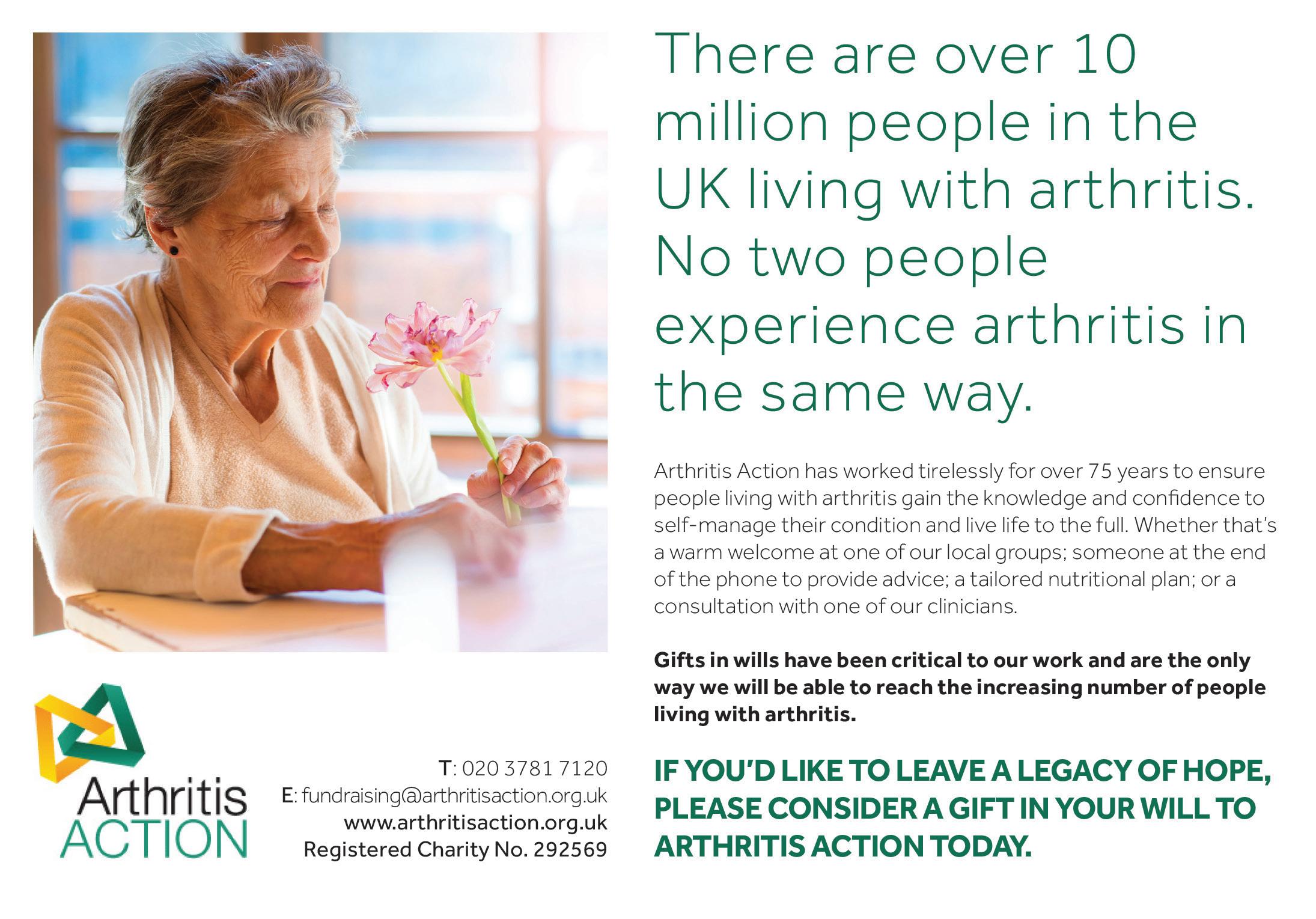
www.northamptonshirelawsociety.co.uk 17 Northamptonshire Law Society

How will the cost-of-living impact gifts in Wills?
Today, almost six in ten (59%) people in the UK feel their finances are worsening, one in four households are struggling to pay the bills and, inevitably, this means that many people are having to hold off from donating to good causes.
The irony of this is of course that, as people struggle to heat their homes, pay the rent and put food on the table, demand for charitable services becomes all the more urgent. We’re now at the point where 9 out of 10 food banks fear they won’t be able to meet the public’s needs and reduced funding means services may well face cuts or even closures, whether that means fewer people to field calls to mental health support lines, cutbacks on sports facilities or community outreach services and all manner of charitable services.
In this environment, income from charitable legacies is vital, strengthening charities’ resilience for the years to come. Gifts in Wills now raise £3.5 billion for good causes annually and, for many, that income has become the defining factor as to whether organisations can keep their doors open, whether they can pivot to deliver services in new ways and –in some cases – even to enhance their support for those in need.
What’s more, in a challenging economic world, gifts in Wills – which won’t leave a donor’s bank account until after the donor has passed on – can be not only a deeply symbolic and meaningful decision, but an attractive and practical offering. And this is where legal professionals are playing an increasingly important role.
Role of solicitors and Will writers
Our tracking study indicates that one in five Wills handled by UK legal advisers (22%) now include a donation to charity.5 The public is twice as likely to make a gift when a professional adviser references the charitable option. And solicitors and Will-writers alike are seeing growing demand for end-of-life planning that reflects people’s deep connections with good causes.
While charitable Wills were once perceived to be the domain of those who are child-free, there is far greater awareness now that people of all backgrounds – those with family and without – often feel a strong desire to leave the world a better place. Gifts in Wills can be a fantastic way of shaping the world they leave behind for future generations. And when it comes with such a generous tax benefit, this is a welcome bonus.
Again, donors often hear about the potential tax break on legacy gifts from legal advisers explaining that such donations are exempt from Inheritance Tax, and that, if they choose to give 10% or more, the remaining IHT bill is reduced further still - charged at 36% rather than 40%. Supporters are unlikely to make fiscal savings that exceed the cost of their donation, but for those who wish to support good causes, that reduction can be a strong incentive.
Although there are multiple avenues for will-writing, the impartiality and ability of solicitors to offer experienced and tailored advice to clients is all the more valued when it comes to making informed decisions about people’s inheritance and how good causes can benefit.
Free campaign supporter scheme for legal advisers
Through our Campaign Supporter scheme, which includes some 800 Will writers and solicitors who commit to making relevant clients aware of the option of leaving a charitable gift in their Will, we see growing demand for legacy giving. And the impact of that shift is considerable. If each of those advisers were to have even just one conversation next year leading to a gift in a Will, this would likely raise around £4 million for good causes. And when those conversations are happening daily, imagine what a difference this could make.
Remember A Charity runs a free Campaign Supporter scheme for solicitors and Will-writers, providing promotional resources and guidance for referencing legacy giving with clients.
Find out more at www.rememberacharity.org.uk/solicitor
Article by Lucinda Frostick Director Remember A Charity
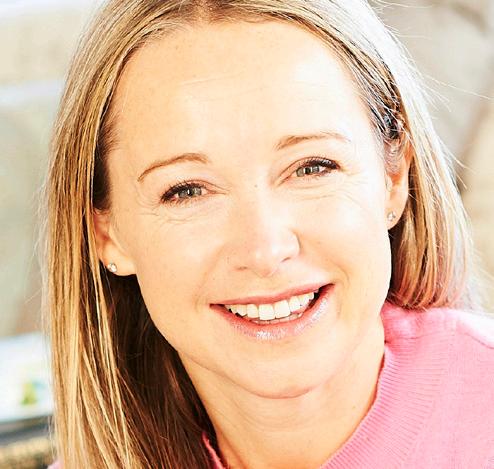
www.northamptonshirelawsociety.co.uk 19 Northamptonshire Law Society
Relationships remain key in the age of technology

Personal relationships are still the heartbeat of business success, despite the increasing use of technology. Personal relationships convey how we value one another. Personal relationships enable us to have empathy with one another’s situations.
In his seminal book, “How to win friends and influence people,” Dale Carnegie wrote
“If there is any one secret of success, it lies in the ability to get the other person’s point of view and see things from that person’s angle as well as from your own.”
Business relationships then are as much about understanding the challenges we all face in our daily encounters.
The search industry has seen significant changes in recent years. Massive consolidation has seen so many of the traditional search companies swallowed up into larger corporates. We have to find ways of differentiating our service offerings, building that trust in client relationships, and delivering services which conveyancers feel add value to their business.
Don’t get me wrong, consolidation has brought with it huge advances in technology and customer experience. Gone are the days of endlessly calling suppliers to order reports, collating them manually, printing off reams of paper and hand delivering the search to the office…. and good riddance too! With the exception of local authority searches, most of the reports are now available same day, with many returned in minutes.
The delivery platforms are slicker, smarter, more intuitive and spot potential risks that might need to be accounted for, and errors in search requests. But some of this technological advancement has come at the expense of good, old-fashioned customer service. The personal touch.
Do we rely on technology too much? Are chat bots, apps and portals what our clients really want and need? What happens when things go wrong? People need reassurance, they need to be able to pick up the phone, or send an email, and feel as though somebody is taking a personal interest in resolving their issue rather than “chat” to a faceless bot or send messages via portals.
I recently won back a client from a rival supplier. When I asked what it was that brought them back to us they said that they felt as
though they were a number, rather than a client. It was the personal touch that was missing from their communications; they didn’t feel as though they ever spoke to the same person twice. There wasn’t a familiar voice at the end of phone when things went wrong (as things inevitably do in conveyancing!).
In our experience 90% of orders go through with little to no intervention required. But that 10% is where relationships are made and broken. This is where knowledge, experience, and expertise really make a difference. Recognising that the conveyancer is almost certainly under pressure, whether it be from the client, agent or the other side, and being able to take that weight off and deal with the issue through to completion is a critical part of the business relationship.
Whether it’s a query on a report back which requires clarification, or chasing up an expedited service. It’s about trusting that the job is going to get done right, first time.
The challenge when introducing technology is that you take a step back from that personal touch. You risk losing the experience and expertise provided by the people when you are over-reliant on the technology. At Geodesys we have people who have been with us since the start, 25 years (and counting!), no amount of technology will replace their understanding and expertise. They are an integral part of our account management and customer service offering. They know the search industry inside out.
The key is getting the right combination of technology and people. Going back to Dale Carnegie’s quote; the organisations who can empathise with the clients, and understand how to respond, will be the best at winning friends and influencing others.
Kay Toon is an Account Manager at Geodesys

20 www.northamptonshirelawsociety.co.uk
Northamptonshire Law Society

Women’s History Month shines spotlight on female empowerment in the legal profession over the past century
women solicitors to stay for the long term, enabling them to make it to the top of their profession.
We are proud to have five esteemed women as trustees, who each contributes their individual skills to the proactive and positive interventions that ensure our solicitors in need receive the life-changing support they need.
Our current chair of trustees is Ginny Cannon, a retired in-house commercial solicitor, and a steward of the City of London Solicitors’ Company.
In England and Wales today, more than 52% of lawyers are female. We’ve come a long way since Carrie Morrison was admitted to the roll of solicitors by the Law Society of England and Wales on 18 December 1922. Three more women followed in her ground-breaking footsteps in 1923.
Previously, women could not join the profession as they weren’t classified as ‘persons’ under the Solicitors Act 1843. It wasn’t until the Sex Discrimination (Removal) Act in 1919 that the profession was opened to women.
Celebrating Women’s History Month, this March, has made us aware of the enormous strides forward we have made in the legal profession. Thankfully it is now an arena where female empowerment is embraced and encouraged.
Women solicitors are valued, and their achievements are recognised in a world that aims to be more diverse, inclusive and gender equal.
Women’s History Month highlights the contributions of women to events in history and contemporary society globally.
But while acknowledging the huge impact that has been made by women solicitors over the decades, there’s still no room for complacency.
The SRA’s 2021 diversity survey found that there are significant differences, according to the size of the law firm and by type of work.
Sadly, many highly skilled, experienced and dedicated women solicitors are still leaving the profession before making it to partner. Various reasons, such as long hours and targets, make it impossible for them to achieve a harmonious work-life balance – and so they quit.

The Solicitors’ Charity calls on the legal profession to introduce initiatives that will attract and encourage more
Former chair Christl Hughes is a retired High Street practitioner. She currently chairs our Awards Committee and is Chair of Association of Women Solicitors, London. Christl isa former President of Leicestershire Law Society, and East Midlands Representative on The Law Society Council Membership Committee.
Kirsty McEwen, chairs our People and Development Committee and has been the Charity’s Honorary Treasurer. Kirsty is a partner at leading Black Country law firm Higgs & Sons.
Tanya Dunbar practised as a solicitor at Ashfords LLP until 2016 when she joined the Post Office as an in-house Commercial Lawyer. She now works for EY.
Rebecca Litherland, a barrister and tribunal judge, specialises in welfare benefits law and has significant experience of criminal and family law, as a practitioner and volunteer.
You can find out more about at https://thesolicitorscharity.org/ about-us/our-trustees/
Our charity helps to ease solicitors’ practical, emotional and financial difficulties brought about by challenges such as job loss, low income, debt, bereavement, mental and physical health issues.
In every year but one, we have needed to provide help to more female than male solicitors.
Our most recent Big Report illustrated how this charity helped over 400 female and male solicitors and their dependents in 2021 – with awards totalling £1m helping with personal and economic hardship.
In addition, the funding we provided to LawCare helped them support the mental health and wellbeing of 342 solicitors; 17 solicitors in need of career counselling were referred to Renovo and 43 were given financial and debt advice.
22 www.northamptonshirelawsociety.co.uk
Northamptonshire Law Society
And Finally...
Hello!
I hope that all is well with you…
We kicked off the start of 2023 with a Law and Criminology careers fair hosted at UON. It was a very busy day, and I was overwhelmed by the student’s enthusiasm for their subject matter. A big thanks to Kirstie Best and the other lecturers who invited us to attend.
I was delighted to host the first training session of 2023, kindly delivered by Marsh, and sponsored by Verify 365. It was most informative, and it is always good to have a refresh on best practices!
Further training events are currently being planned for the remainder of the year, along with some networking events, the resurrection of the annual quiz between ICAEW and NLS members, oh and not forgetting a summer party! Keep a look out for the information in your inbox, and on the website.
Looking at the events calendar for 2023, I have been working closely with Dominic Hopkins from HCR Hewitsons on planning the forthcoming Legal Walk. The date is to be confirmed, which should be announced early to mid-March. Dominic has been instrumental in forming a small steering committee, not only from the Legal profession, but from the Active quarter in Northampton.
It’s a shame we are unable to plan the forecast so let’s just keep our fingers crossed on the weather front!
On a personal note, I have been joining some catch up sessions with my counterparts from other counties. It can be a rather insular life all alone in our offices, so to have Michelle from Notts Law Society inject some humour and best working practices, into our everyday agenda, is most welcomed! The majority of Law societies are advising that since Covid there is a real appetite to take a membership, interact and come together to support all sectors of Law.
As always, I look forward to receiving your feedback, and requests for specific training sessions.

I can be contacted on sec.nls@outlook.com or mobile –07543 662572

Best wishes
Carolyn Coles Society Manager

Northamptonshire
www.northamptonshirelawsociety.co.uk 23
Law Society



































































